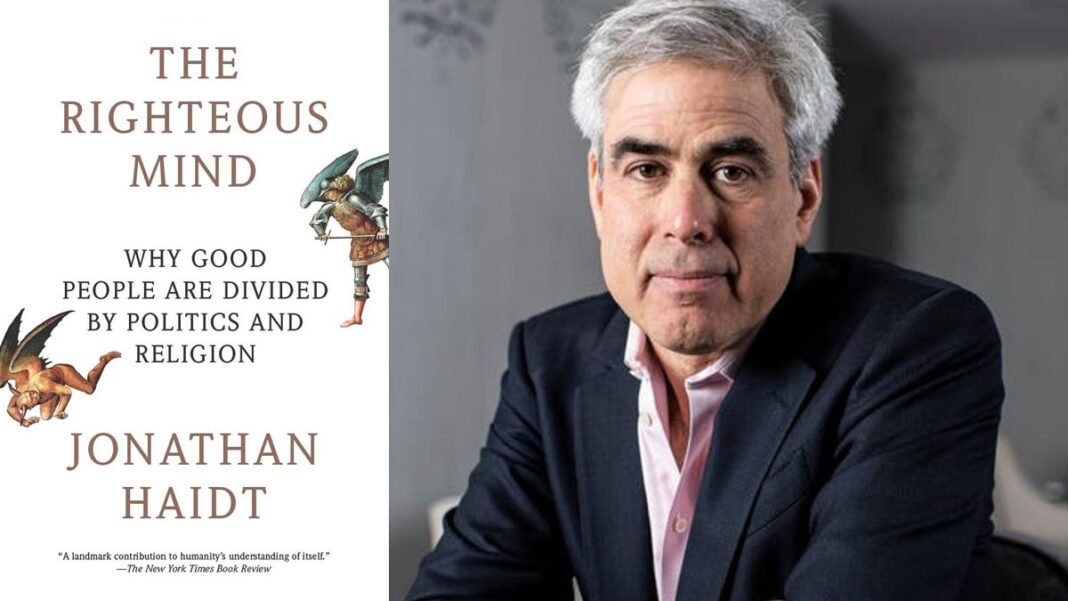‘If you want to know why you hold your moral beliefs and why many people disagree with you, read this book’
~ Simon Baron-Cohen, author of The Essential Difference
Why can it sometimes feel as though half the population is living in a different moral universe? Why do ideas such as ‘fairness’ and ‘freedom’ mean such different things to different people? Why is it so hard to see things from another viewpoint? Why do we come to blows over politics and religion?
Jonathan Haidt reveals that we often find it hard to get along because our minds are hardwired to be moralistic, judgmental and self-righteous. He explores how morality evolved to enable us to form communities, and how moral values are not just about justice and equality – for some people authority, sanctity or loyalty matter more. Morality binds and blinds, but, using his own research, Haidt proves it is possible to liberate ourselves from the disputes that divide good people.
‘A landmark contribution to humanity’s understanding of itself’ The New York Times
‘A truly seminal book’ David Goodhart, Prospect
‘A tour de force – brave, brilliant, and eloquent. It will challenge the way you think about liberals and conservatives, atheism and religion, good and evil’ Paul Bloom, author of How Pleasure Works
‘Compelling . . . a fluid combination of erudition and entertainment’ Ian Birrell, Observer
‘Lucid and thought-provoking … deserves to be widely read’ Jenni Russell, Sunday Times

Review
Review
“Splendidly written, sophisticated and stimulating. It may well change how you think and talk about politics, religion and human nature.”
—NPR
“A landmark contribution to humanity’s understanding of itself. . . . Haidt is looking for more than victory. He’s looking for wisdom. That’s what makes The Righteous Mind well worth reading.”
—The New York Times Book Review
“An eye-opening and deceptively ambitious best seller . . . undoubtedly one of the most talked-about books of the year.”
—The Wall Street Journal
“Ingenious prose. . . . Beautifully written, Haidt’s book shines a new and creative light on moral psychology and presents a provocative message.”
—Science
“A remarkable and original synthesis of social psychology, political analysis, and moral reasoning.”
—Edward O. Wilson, University Research Professor Emeritus, Harvard University
“Highly readable, highly insightful. . . . The principal posture in which one envisions him is that of a scrappy, voluble, discerning patriot standing between the warring factions in American politics urging each to see the other’s viewpoint, to stop demonizing, bashing, clobbering. . . . Haidt’s real contribution, in my judgment, is inviting us all to sit at the table.”
—Washington Times

“Excellent. . . . An impressive book that should be read by anyone who has the slightest interest in how political opinions are reached.”
—The Daily Beast
“Haidt’s work feels particularly relevant now. . . . Haidt’s perspective can help us better understand our own political and religious leanings.”
—San Francisco Chronicle
“Jonathan Haidt is one of smartest and most creative psychologists alive, and his newest book, The Righteous Mind is a tour de force—a brave, brilliant and eloquent exploration of the most important issues of our time. It will challenge the way you think about liberals and conservatives, atheism and religion, good and evil. This is the book that everyone is going to be talking about.”
—Paul Bloom, Brooks and Suzanne Ragen Professor of Psychology, Yale University
“Haidt’s research has revolutionized the field of moral psychology. This elegantly written book has far-reaching implications for anyone interested in anthropology, politics, religion, or the many controversies that divide modern societies. If you want to know why you hold your moral beliefs and why many people disagree with you, read this book..”
—Simon Baron-Cohen, Cambridge University, Author of Zero Degrees of Empathy and The Science of Evil
“A much-needed voice of moral sanity.”
—Booklist
“[Haidt’s] framework for the different moral universes of liberals and conservatives struck me as a brilliant breakthrough . . . The Righteous Mind provides an invaluable road map.”
—Miller-McCune.com

“A well-informed tour of contemporary moral psychology…A cogent rendering of a moral universe of fertile complexity and latent flexibility.”
—Kirkus Reviews
“Haidt’s a good thing.”
—The Atlantic
“Jonathan Haidt’s absorbing The Righteous Mind should come with a warning label: ‘contents highly addictive.’ Written in a breezy and accessible style but informed by an impressively wide range of cutting-edge research in the social sciences, evolutionary biology and psychology, The Righteous Mind is about as interesting a book as you’ll pick up this year.”
—The Globe and Mail
“What makes [The Righteous Mind] so compelling is the fluid combination of erudition and entertainment, and the author’s obvious pleasure in challenging conventional wisdom. . . . [Haidt’s] core point is simple and well-made: our morality, much of it wired into brains from birth, at the same time binds us together and blinds us to different configurations of morality.”
—The Guardian (London)
“An important and timely book. . . . His ideas are controversial but they make you think.”
—Bill Moyers, Moyers & Company
“The Righteous Mind refutes the ‘New Atheists’ and shows that religion is a central part of our moral heritage. Haidt’s brilliant synthesis shows that Christians have nothing to fear and much to gain from the evolutionary paradigm.”
—Michael Dowd, author of Thank God for Evolution

“The Righteous Mind is an intellectual tour de force that brings Darwinian theorizing to the practical realm of everyday politics. The book is beautifully written, and it is truly unusual to encounter a book that makes a major theoretical contribution yet encourages one to turn its pages enthusiastically.”
—Christopher Boehm, Professor of Anthropology, University of Southern California, author of Moral Origins
“As a fellow who listens to heated political debate daily, I was fascinated, enlightened, and even amused by Haidt’s brilliant insights. This penetrating yet accessible book will help readers understand the righteous minds that inhabit politics.”
—Larry Sabato, University of Virginia, author of A More Perfect Constitution
“A profound discussion of the diverse psychological roots of morality and their role in producing political conflicts. It’s not too much to hope that the book will help to reduce those conflicts.”
—Richard E. Nisbett, University of Michigan, Author of The Geography of Thought
About the Author
He received his Ph.D. in social psychology from the Univ. of Pennsylvania in 1992 and then went to the Univ. of Chicago for additional training in cultural psychology. He’s been active in the positive psychology movement since 1999, and in 2001 was awarded the Templeton Prize in Positive Psychology. He’s received 4 awards for his teaching, including the 2004 Outstanding Faculty Award conferred by the Governor of the State of Virginia, Mark Warner. –This text refers to an alternate kindle_edition edition.









